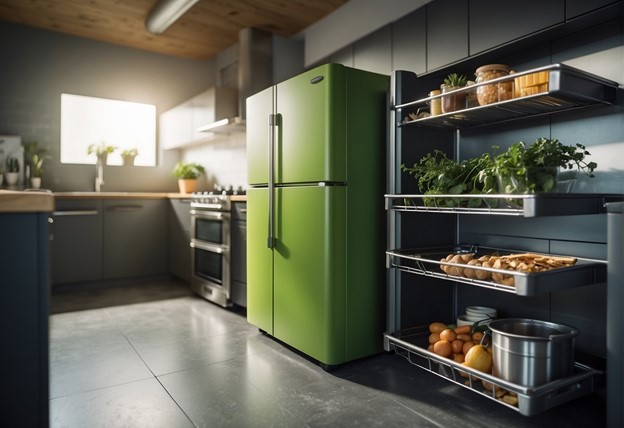
Eco-Friendly Kitchen Renovations: Tips for Sustainable Remodeling
By: JP Drolet
Boarding on a kitchen renovation presents the perfect opportunity for us to integrate sustainable practices into our homes.
Implementing eco-friendly design is more than just a trend; it’s a commitment to reducing environmental impact while fostering a healthier living space.
By choosing materials and technologies that have a lower ecological footprint, we not only contribute to the well-being of our planet but also can improve our daily living experience.
As we plan our kitchen remodels, we’re faced with numerous decisions—from cabinetry and countertops to appliances and flooring.
Each choice comes with environmental considerations, and options like energy-efficient lighting, low VOC paint, and responsibly sourced materials help us create a kitchen that aligns with our values.
Moreover, water-saving fixtures and smarter waste management during construction are important practices for making our renovation process as green as possible.
Key Takeaways
- Integrating sustainable practices in kitchen renovations promotes environmental stewardship and healthier living spaces.
- Selecting eco-friendly materials and energy-efficient appliances reduces our ecological footprint.
- Responsible water usage and waste management practices are critical during and after the remodeling process.
The Green Revolution in Kitchen Remodeling

In boarding on our eco-friendly kitchen remodel, we prioritize sustainable practices to ensure our cooking spaces are not just stylish but also kind to the planet.
When we think of sustainable kitchen design, we imagine a room teeming with energy-efficient appliances and responsibly sourced materials.
Here are key components to consider:
- Appliances: Focus on products with an Energy Star label, as they are designed to minimize energy consumption. This simple choice can significantly reduce our carbon footprint.
- Materials: For countertops and cabinets, opt for sustainable options like bamboo or reclaimed wood, which are both renewable and add a natural charm to our kitchen.
- Paints and Finishes: Always select low-VOC or no-VOC paints and finishes to improve indoor air quality, ensuring that our kitchens are safer for us and the environment.
| Green Kitchen Renovation Ideas | Description |
| Energy-Efficient Lighting | LED bulbs consume less power and last longer. |
| Water-Saving Fixtures | Installing aerators on faucets to reduce water flow. |
| Composting | Incorporate built-in compost systems to manage organic waste effectively. |
Each of these elements contributes to a holistic approach to creating kitchens that are as green as they are beautiful.
Taking these steps is not just beneficial for our planet; it can also lead to savings on utility bills, making a green kitchen renovation a wise investment for our future.
Why Choose Eco-Friendly Materials

When we decide to renovate our kitchen, choosing eco-friendly materials is not just about aesthetics or functionality; it’s about ensuring that our choices have a positive impact on our planet.
Using materials that are better for the environment often means we’re picking options with fewer chemicals, less waste, and more sustainable manufacturing processes.
Eco-Friendly Countertop Materials
Recycled glass countertops are a stunning and responsible choice for our kitchen renovation.
Each countertop is unique, made with pieces of recycled glass held together with a resin base.
Not only do these countertops give a second life to glass that would otherwise end up in a landfill, but they also add a sparkling touch to our kitchen.
By opting for eco-friendly countertop materials, we reduce our carbon footprint and support sustainable industry practices.
Sustainable Kitchen Flooring Options
For flooring that’s kind to the earth and our feet, there are several sustainable kitchen flooring options worth considering.
One top choice is bamboo flooring, an incredibly renewable resource that regenerates quickly without the need for replanting.
Another option to consider is cork, a material that’s not only comfortable and warm but also made from the bark of cork oak trees, which naturally regrows over time.
Both options offer a range of styles and hues to suit our tastes.
Low-VOC Kitchen Cabinets
Choosing low-VOC kitchen cabinets means we’re getting beautiful cabinetry without the harmful chemicals traditionally found in the adhesives and finishes used in cabinet manufacturing.
Volatile organic compounds (VOCs) can contribute to indoor air pollution, which we certainly want to avoid in our homes.
Opting for bamboo kitchen cabinets is another fantastic way to go green. Bamboo grows rapidly, absorbs carbon dioxide, and can be cultivated with minimal environmental impact, making it an outstanding material for our eco-conscious kitchen.
Energy-Efficient Appliances: A Win-Win

When we think about remodeling our kitchen, prioritizing energy-efficient kitchen appliances can lead to significant savings on utility bills, and it’s a solid step towards sustainability.
Choosing appliances with an ENERGY STAR certification ensures that we’re incorporating the most efficient products available into our daily routine.
| Appliance Type | Benefit |
| Refrigerators | Use less energy and keep food fresh longer |
| Dishwashers | Conserve water and energy |
| Ovens and Ranges | Increase cooking efficiency with less energy wasted |
Energy-efficient appliances operate more effectively, and many also come with advanced features that make them a pleasure to use.
Investing in these appliances may come with a higher upfront cost, but the long-term savings are a win for both our wallets and the environment.
Maintaining these appliances properly can also maximize efficiency.
We can follow simple steps such as regularly cleaning refrigerator coils or descaling the dishwasher to ensure our investments are running optimally.
Water Conservation Techniques

Water conservation is not just eco-friendly; it’s a smart way to save on our utility bills.
- Low-Flow Faucets: By installing low-flow faucets, we can significantly cut down on water use without compromising on functionality.
- Aerators: An aerator is a simple yet effective device that we can add to our faucets. This clever tool mixes air with water, providing a high-pressure feel while using less water overall.
- Water Filtration Systems: To cut down on plastic waste from bottled water, consider investing in a water filtration system.
This also encourages us to drink more tap water, knowing it’s clean and tastes great.
| Kitchen Activity | Conventional Method | Water-Saving Alternative |
| Washing Produce | Running Tap | Bowl of Water (Reuse) |
| Cooking Pasta/Rice | Open Pot | Lid On (Retains Heat & Water) |
| Cleaning Dishes | Running Water | Fill Sink or Basin |
By aligning ourselves with these water-saving kitchen fixtures and smart practices, we can contribute to conservation efforts.
Our eco-friendly kitchen will not only be a statement of sustainability but also a testament to our commitment to protecting our planet’s precious resources.
Waste Reduction Strategies during Your Remodel
Starting a kitchen renovation presents an excellent chance for us to reduce waste and positively affect the environment.
By meticulously planning our update, we can make the most of the materials we already have and opt for eco-friendly alternatives.
- Donate or Sell: Before we demolish, let’s consider donating or selling cabinets, appliances, and fixtures that are in good condition. This not only reduces landfill waste but also helps others in need.
- Repurpose Materials: We can get creative with old materials. For instance, wood from cabinets can be transformed into open shelving or a new pantry door.
| Material | Strategy |
| Wood | Repurpose or recycle |
| Metals | Separate and recycle |
| Glass | Recycle if possible |
| Packaging | Recycle or reuse for storage |
For new purchases, opt for eco-friendly materials, such as bamboo, and ensure that appliances are energy-efficient to reduce future waste.
Strategize waste sorting, clearly marking bins for recyclables, compostables, and trash during the remodel.
By staying committed to these strategies, we can take pride in a kitchen remodel that’s as green as it is beautiful.
Smart Kitchen Innovations
Initiating green kitchen remodels, it’s crucial to integrate smart kitchen technologies to enhance sustainability.
These cutting-edge solutions not only improve the functionality of our kitchens but also substantially lower our environmental impact.
- Energy-Efficient Appliances: Opting for appliances with high energy ratings can lead to considerable energy savings. Look for the ENERGY STAR label—it’s our trustworthy guide to choosing efficient models.
- Sustainable Materials: Prioritize materials that are both durable and eco-friendly. Bamboo is a renewable resource for countertops and cabinetry, while recycled glass makes for unique, low-impact surfaces.
- Smart Lighting: Incorporating LED bulbs and smart lighting systems allows us to adjust the ambiance and save energy. Motion sensors can also help to ensure lights aren’t left on unnecessarily.
- Water Conservation Fixtures: Low-flow faucets and dishwashers can significantly reduce water consumption. These smart innovations help us manage water more effectively.
- Induction Cooking: Modern induction cooktops offer faster and more precise cooking while being more energy-efficient than traditional gas or electric stoves.
By integrating these smart kitchen innovations into our green kitchen remodel, we align our home with our commitment to sustainability.
Let’s make thoughtful choices that contribute to a healthier planet.
Partnering with the Right Professionals
As we begin a kitchen renovation with sustainability in mind, choosing the appropriate experts is crucial to bring our eco-conscious vision to life.
Opting for contractors with expertise in environmentally friendly building techniques can significantly contribute to our project’s success.
Here’s our strategy for selecting the right team.
- Credentials: Look for certifications such as LEED (Leadership in Energy and Environmental Design), which indicate a commitment to sustainability.
- Experience: A portfolio of previous eco-friendly projects gives us insight into their expertise and creativity.
- Materials Source: Professionals who prioritize sustainable materials and understand their impact are invaluable. Partners should be familiar with non-toxic, sustainable cabinets and low-VOC finishes.
- Energy Efficiency: The ideal partner will also value energy-efficient design, from LED lighting to ENERGY STAR appliances.
- Waste Reduction: An eco-conscious contractor will have strategies to minimize waste and recycle materials.
Initially, a list of potential contractors is compiled. Questions are then posed to assess their dedication to environmentally friendly practices.
Subsequently, their references are reviewed to confirm they align with the standards set for an eco-friendlier kitchen.
Through this methodical selection process, a team is formed that aligns with the environmental values and aims to achieve the objective of creating a sustainable kitchen space.
How to Maintain an Eco-Friendly Kitchen Post-Renovation
After we’ve leaped into a sustainable kitchen, keeping it green is up to our daily habits. Let’s start with the way we manage waste.
Composting is an excellent method for dealing with organic scraps; it reduces landfill waste and gives us nutrient-rich soil for our plants. Keep a compost bin handy to reinforce this habit.
As for cleaning, let’s choose eco-friendly products.
The harsh chemicals found in conventional cleaners can be harmful to the environment and our health.
Opt for natural cleaners or make your own from vinegar, lemon, and baking soda.
Here’s a simple checklist to follow:
Waste Management:
- Recycle and compost diligently.
- Use larger bins for recycling and smaller ones for landfill waste
Energy Conservation:
- Use energy-saving appliances only when necessary.
- Maintain appliances to ensure efficiency
Water Use:
- Fix leaks immediately
- Install an aerator on the faucet to reduce water flow
In the kitchen, we can also be mindful of our water usage. Slight changes, like fixing a leaky faucet promptly or installing an aerator, can make a massive difference eventually.
Lastly, let’s support sustainable food systems by buying local and organic produce. This not only reduces our carbon footprint but also supports local farmers.
By incorporating these practices into our routine, our eco-friendly kitchen will remain a testament to our commitment to sustainability.
Conclusion
Renovating your kitchen is a golden opportunity to embrace sustainability. We’ve explored eco-friendly practices and materials that pave the way for a greener lifestyle. Go for ones with top-notch energy ratings.
Choose appliances that save energy—your wallet and the Earth will thank you. Imagine walking on bamboo floors and using recycled glass counters. They’re not just cool to look at; they’re good for the Earth, too.
Remember to recycle, compost, and organize to cut down on waste. And use paints that are better for breathing. These smart moves make your kitchen better and help the planet too. Plus, saving energy means saving money, so it’s a win-win!
When we all do our part, even minor changes add up to big differences for our world. Ready to make your kitchen and the planet happier?
What’s one eco-friendly change you’re excited to try? Share your thoughts or discover more ways to go green.
Let’s inspire each other!
Kitchen and Bath Renovation Made Easy: Countertops, Cabinets, and More under One Roof
Is your kitchen stuck in the past? Does your bathroom lackluster and outdated? Delorie Countertops & Doors can transform your home’s most important spaces into functional and stylish havens.
We offer a complete kitchen and bath renovation experience, from expert design and material selection to flawless installation.
We don’t just do countertops (though we have a stunning selection of those, in quartz, laminate, and solid surface).
We also design, build, and install custom cabinets to perfectly match your style and needs.
Don’t settle for a kitchen or bath that just functions – create a space you love. Contact Delorie Countertops & Door today for a free consultation and let us help you turn your dream kitchen or bath into a reality.
Frequently Asked Questions
What are the best eco-friendly materials to use for kitchen countertops?
Eco-friendly countertops can be both durable and sustainable. Materials like recycled glass, bamboo, and quartz are popular options that offer longevity and a reduced environmental impact.
How can I improve energy efficiency in my kitchen during a remodel?
Improving energy efficiency can start with installing energy-efficient lighting like LEDs and choosing Energy Star-rated appliances, which consume less power and reduce your kitchen’s overall energy footprint.
What are some sustainable flooring options for a kitchen renovation?
For sustainable flooring, consider materials like cork, bamboo, or reclaimed wood. These options not only offer unique aesthetic appeal but are also sourced from renewable or recycled materials.
Are there any specific brands that are known for sustainable kitchen appliances?
Yes, certain brands specialize in sustainable appliances. Look for companies with a strong commitment to energy efficiency and that offer products with lower environmental impacts, such as Energy Star-rated refrigerators, dishwashers, and ovens.
How can I ensure the cabinetry I choose for my kitchen is environmentally friendly?
Opt for cabinetry made from sustainably sourced wood or recycled materials. Cabinets that avoid the use of harmful chemicals like formaldehyde in their adhesives and finishes will also contribute to a healthier and more eco-friendly kitchen.
What should I consider when choosing paint or finishes for a green kitchen remodel?
When selecting paint or finishes, look for products labeled low or zero VOC (Volatile Organic Compounds). These products are healthier for both the environment and our indoor air quality. Make sure to choose products that ensure your kitchen is as green as it is beautiful.










